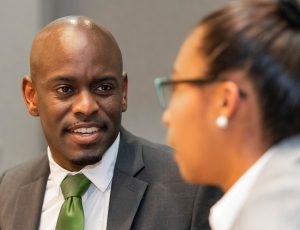October 27, 2020
Every challenge presents an opportunity
 When COVID-19 shifted many workplace meetings to virtual interactions, COB management faculty Kathryn Carroll, Anthony “TD” Gribble, and Sharon Justice seized onto these workplace changes. Together, the team recently designed and implemented some new approaches to teach proven professional skills that are as important today as ever in BUSI 3200 – Professional Development and Ethical Leadership, the third class in our four-part undergraduate Leadership and Professional Development Curriculum. In this course, all students graduating from the College of Business participate in practice interviews, networking activities, and leadership exercises to prepare them for the college-to-workplace transition. Now, some components have a virtual twist.
When COVID-19 shifted many workplace meetings to virtual interactions, COB management faculty Kathryn Carroll, Anthony “TD” Gribble, and Sharon Justice seized onto these workplace changes. Together, the team recently designed and implemented some new approaches to teach proven professional skills that are as important today as ever in BUSI 3200 – Professional Development and Ethical Leadership, the third class in our four-part undergraduate Leadership and Professional Development Curriculum. In this course, all students graduating from the College of Business participate in practice interviews, networking activities, and leadership exercises to prepare them for the college-to-workplace transition. Now, some components have a virtual twist.
Practice Interviews
One of the most significant changes has been with student practice interviews. While the landscape of recruitment and hiring has become more dependent on virtual interactions, our team has been focused on designing and refining our practice interviews. Using valuable feedback from a workshop Carroll and Justice hosted with the College of Business’s Management Advisory Committee last fall, faculty overhauled the interview format, delivery and student evaluation process. This semester, our team was ready for the challenge and converted the face-to-face interviews to online course delivery and launched a series of virtual practice interviews for students. Students still learn the basics of capturing, communicating and promoting their achievements. Now they have the extra benefit of learning how to use virtual meeting technology to enhance their professional image. From what to wear to lighting adjustments and platform controls, students are ready for their interview and transacting business virtually in a professional and effective manner as they move forward in their careers.
- Kathryn Carroll
- Anthony “TD” Gribble
- Sharon Justice
Networking
Networking in a virtual environment is not impossible. In addition to expanding their network with business professionals via virtual practice interviews, students are taught the importance of building a strong network of business relationships from the beginning of the course. To foster relationship-building skills, faculty have redesigned and replicated face-to-face ice-breakers with virtual tools while also shifting to interactive technology when virtually lecturing in real time. Break-out rooms and virtual polling are just a few tools that faculty are using to build student interaction and drive discussion. Small teams have been created in each course to foster additional relationship-building opportunities, allowing students to interact as a team and hold each other accountable as they push through projects and provide one another with written peer feedback. These interactions are designed to help students become more self-aware of their leadership and communication styles while learning more about others’ styles.

Virtual tools have helped convert face-to-face networking opportunities to relationship-building opportunities (photo taken pre-COVID).
Industry Alumni
Finally, people are the most valuable resource in any organization, and the College of Business is fortunate to have alumni, advisory councils, and partners willing to offer their experience and knowledge to our students. Weaving talks from industry leaders into our curriculum provides students a current perspective on the state of business. Recent graduates have volunteered to make virtual appearances in classes and to share their experiences offering reassurance that challenges can be overcome, and our students can thrive in dynamic, evolving workplaces. While the way we interact with outside resources has changed, the lessons our students can learn are timeless.
We continue to create new opportunities to integrate relevant, current technology and research to continue sharing valuable professionalism lessons with our students. While we may be forced to meet virtually with students who might merely be across town, using video conferencing and other software, the lessons they are learning will help them build teams and transact business across the world.
To volunteer to interview or share with our students, please contact our BUSI 3200 faculty team at BUSI3200@ecu.edu.



